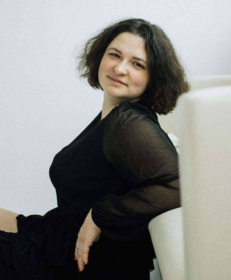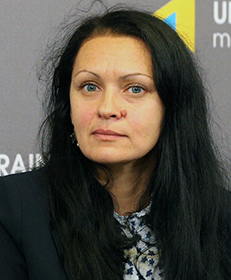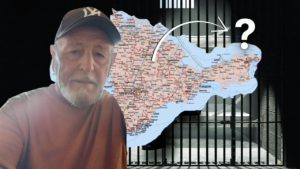For the First Time to Life Imprisonment: How a Russian Court Sentenced a Family from Melitopol
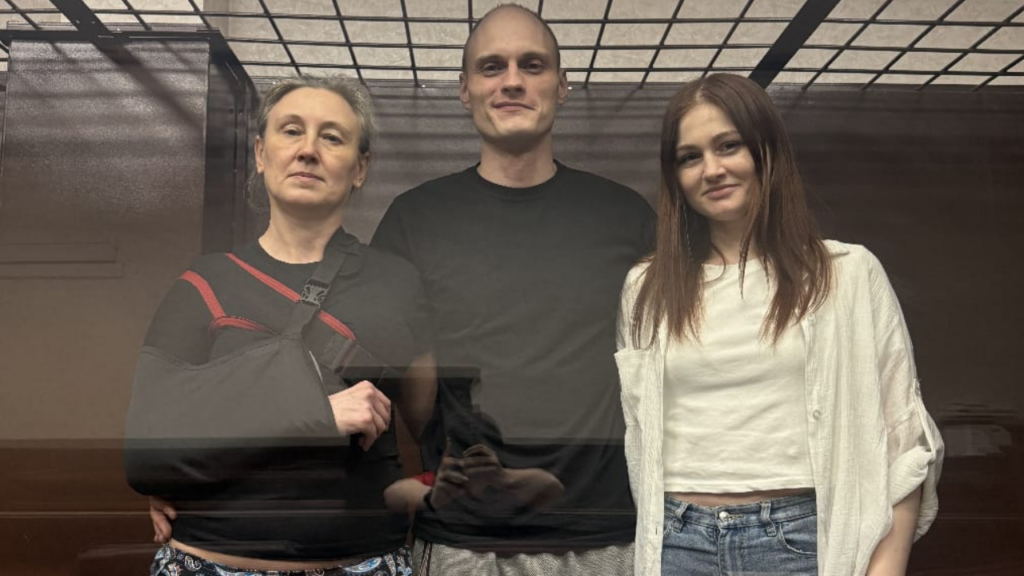
The Southern District Military Court in Russia’s Rostov-on-Don sentenced three civilians from Melitopol in the Zaporizhzhia Region in a case involving explosions in the city. 31-year-old Artem Murdid was sentenced to life imprisonment; his common-law wife, 28-year-old Hanna Voshkoder, was handed down a sentence of 20 years in a general regime colony. Artem’s 50-year-old mother, Hanna Murdid, received 22 years.
Due to the closed nature of the Rostov court and the inability of representatives of international organizations to access the proceedings, little is known about the trial or the charges against the three individuals from Melitopol. MIHR has spoken with the family acquaintances to learn what the “convicts” were doing before their arrest, when and how the arrest occurred, and what the possible reasons might be.
“I just couldn’t remain unconcerned, so I started searching”
— My name is Kateryna. At the time of the full-scale invasion, I lived in Kharkiv. Before that—in Zaporizhzhia, but I hail from Melitopol. I know Artem’s family well: my grandmother lived in the neighboring house and worked with his mother.
Kateryna scrolls through her social media feeds and stops at a photo on Instagram:
— Sometime in early 2024, I realized I hadn’t seen anything from Artem on social media for a while. He used to post stories or photos, and then—there had been nothing for half a year. I decided to wish him a Happy New Year. A week went by, then two—without a response. I googled him, and one of the Ukrainian websites showed that Artem was listed as missing. Another—Russian—reported that he was accused of committing a terrorist act. I was shocked and didn’t know how to react.
The young woman continued to search for information.
“I was hesitant to call Artem’s relatives who were not under occupation. We had a difficult relationship, and someone might think that I was interfering in other people’s lives.”
But then I made up my mind: the person is in a difficult situation, and someone needs to stand up for him. I do care, and I want to try to help. They charged Artem with so many things that they could have sentenced him to life imprisonment.
I reached out to acquaintances in Melitopol. But my questions remained unanswered. Some claimed that such a thing couldn’t have happened, while others mentioned that people in the occupied territories were constantly being taken to basements.
It later emerged that Artem had been detained by the FSB on March 31, 2023. The following day, his mother and girlfriend were also detained. Acquaintances informed Kateryna that there was video footage of the detention.
— I searched for that video—typed in phrases like “Melitopol partisans,” “people from Melitopol,” and “the three from Melitopol.” I came across a lot of news about the arrest of Melitopol partisans. Eventually, I thought of using the word “saboteurs.” And that’s when I found articles in Russian media.
Russian media sources published a video of the so-called detention back in June 2023.
Video of Artem Murdid’s detention
Kateryna watches the video. It is filmed from a drone, but she can’t quite recognize the area in Melitopol—it might be the so-called Zhytlomasyv neighborhood or possibly the central part near the abandoned city cemetery. A male figure wearing jeans, a black jacket, and a hoodie walks away from a white car, moving along the road and then through some bushes. Behind him, a black minivan appears, from which several men in uniforms with “FSB” signs on their backs rush out and detain the man. Near the white car, a woman is also detained—her arms are twisted behind her back, and she’s led to the van. All faces are blurred.
— The woman in the video looks like Artem’s mother. I know her—I’ve seen her many times,—Kateryna explains. — Then [in the video], the detainees claim they were collaborating with the Security Service of Ukraine.
That was all Kateryna was able to find out. Their current whereabouts remained unknown.
— One evening, a young woman I didn’t know messaged me. I usually don’t add strangers as friends on Facebook, but this time, I decided to accept the request. She asked if I knew Artem Murdidov. Although she got the last name slightly wrong, I replied I did. Then she informed me, “He’s in a cell with my husband.” The woman had been merely messaging everyone in Artem’s social media contacts—and there weren’t many.
That’s how Kateryna found out that Artem Murdid was being held in Russia, in Pre-trial Detention Center No. 1 in Rostov-on-Don, that a trial was about to begin, and that three of them had been charged with committing a terrorist act, participating in a terrorist organization, and possessing explosives.
The woman is convinced the accusations are fabricated, but she reflects:
“Could Artem have acted in Ukraine’s interests? He’s very stubborn, strong-willed, and confident. With those traits, if he had something in mind, nothing could stop him. But at the same time, he had a family. I believe the responsibility for them would have held him back from doing anything reckless.”
“Artem had some “visitors” who offered him a job in the service”
Ruslan (name changed for security reasons), a friend of Artem’s, stayed in contact with Murdid almost up until the moment of his detention.
— Melitopol was under occupation, and there wasn’t much work. Artem was barely working at the time. Before that, he had worked as a bank cash-in-transit. He saw how some of his former friends had switched sides and joined the Russian security forces, so talking to them was out of the question. “Visitors” came to his house and offered him a job, saying that the salary was good. However, Artem refused. He was liable for military service, had completed his compulsory service, and had sworn allegiance to the Ukrainian people. That also made it hard for him to leave. People like Artem were being watched closely. Some were taken away for interrogation and held for a week.
Ruslan doesn’t know what exactly Artem did in the city. The only thing he noticed was that Murdid was cautious in his correspondence and maintained confidentiality. But then again, it’s impossible to live any other way under occupation.
— When I heard about the explosion, I was stunned, — Ruslan recalls. — There was no way to find out any details: you couldn’t reach out to acquaintances, and you couldn’t ask his relatives to come to the Murdids’ apartment—they would immediately fall under suspicion. Artem deleted his correspondence in messengers.
Ruslan came across the mentioned “detention video” earlier.
— Of course, it was staged.
Friends managed to find out that after the detention, Artem’s mother and girlfriend were taken to Yakymivka, a small town about 30 kilometers from Melitopol. The Russians set up a detention site in the local police station at 21 Pushkin Street. This location held most of the women detained in Melitopol. Artem, however, was kept in Melitopol in the central police department building, in the so-called pre-trial detention center. In a cell designed for four, around 20 men were held at the same time. The FSB controlled the facility. After that, they were likely held in the detention center in occupied Mariupol before being transported to Rostov in Russia.
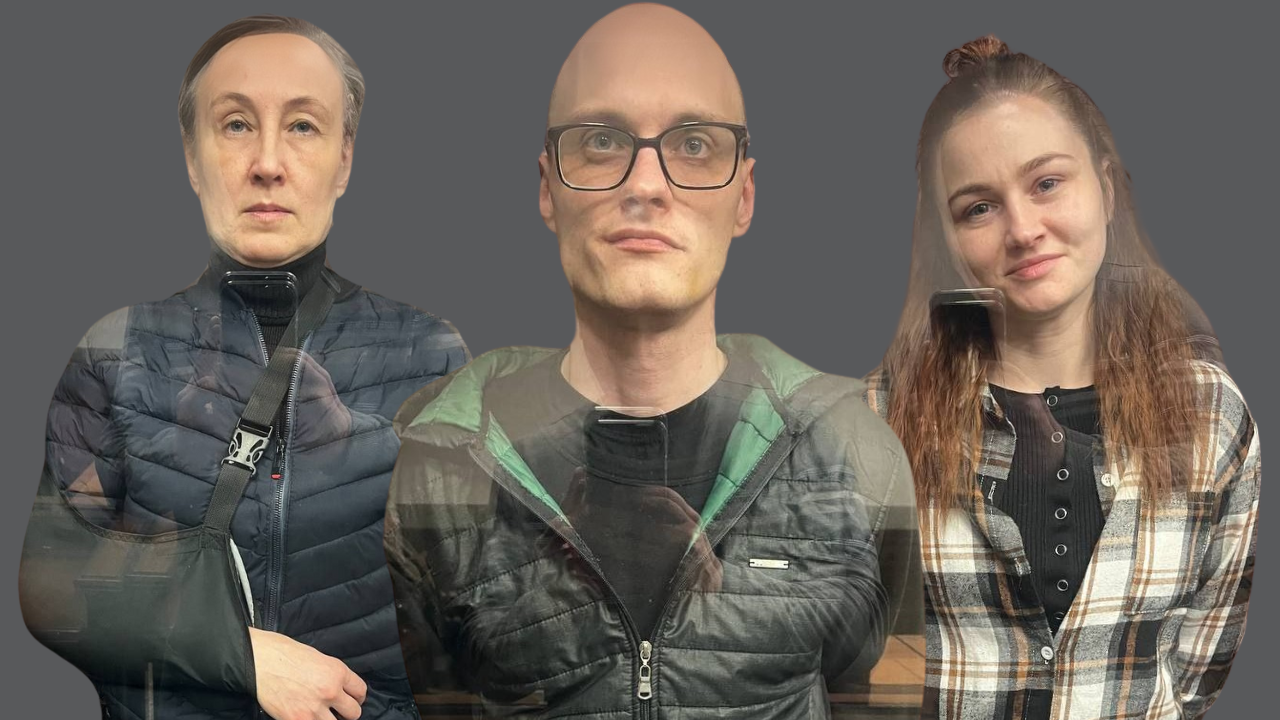
Artem Murdid (center), his mother (left), and his girlfriend (right)
Friends are aware of the pressure exerted on the residents of Melitopol. Hanna Voshkoder was tortured: she was beaten, had a bag placed over her head, and was threatened that her young child would be taken away, transported to an unknown location, placed with another family, and given a different last name — they said they would “find new parents.” Hanna Murdid was also beaten — she already had issues with her right arm before the detention, but the beatings made the injury worse; recent court photos show her wearing a bandage. Artem was tortured as well. All three were pressured to assist the FSB in searching for partisans in Melitopol.
The case of Artem, Hanna Murdid, and Hanna Voshkoder was submitted to the Rostov court on October 8, 2024—a year and a half after their detention. Since then, 15 court hearings have been held.
Hanna Voshkoder and Hanna Murdid were charged with the illegal trafficking of explosives as part of an organized group, participation in a terrorist organization, committing a terrorist attack that resulted in a person’s death, and terrorism. In addition to these charges, Artem Murdid was also accused of the illegal manufacture of explosive devices by an organized group.
According to the FSB’s version, in June 2022, “being a supporter of pro-Ukrainian ideology,” Artem Murdid allegedly established contact with a person named “Oleh” and later involved his girlfriend and mother in the activities. The Russians claimed that the unidentified “Oleh” provided targets and coordinates of explosive caches, sent detonators and microchips hidden inside a doll through a liaison, and gave Artem instructions on assembling explosive devices via Telegram.
Together, they allegedly surveilled employees of the occupying military-civil administration and heads of state-owned enterprises with the intent to assassinate specific individuals. They were accused of placing explosives under a railway track, organizing an assassination attempt on the Melitopol Railway state enterprise head and the authorized head of the city’s occupation military-civilian administration, as well as planting a homemade explosive device under the car of collaborator Ivan Tkach on March 14, 2023.
The Russian prosecution claimed the motive was “hostility toward the Russian Federation.”
The Verdict Against Ukrainian Citizens
On June 2, 2025, three hearings were held in Rostov as part of the case. During one of them, the defendants delivered their final statements.
— We all understand that proceedings like these have become routine for you. However, I sincerely ask you not to be guided by that sense of routine when making your final decision.
I have never committed any unlawful acts in my life. I learned about the nature of the charges against me only from representatives of Russian law enforcement, who created certain physical conditions — violence and torture — as a result of which I was forced to give testimony on which the prosecution is based.
I sincerely believed that I was living in Ukraine. Therefore, I was subject exclusively to Ukrainian law. I have never been a supporter of Nazi ideology. Living in a multinational country, I never gave a thought to looking down on anyone because of their nationality, — Artem Murdid noted.
— I would like to draw your attention to the fact that I am not a Nazi and do not hold nationalist views. Therefore, I ask you to exclude this aggravating circumstance from consideration. I also request that you take into account my health condition and the fact that I require constant medical care. I want to formally state that I was subjected to physical violence after my detention — specifically torture with electric shocks and beatings, — Artem’s mother, Hanna Murdid, claimed.
— I am a citizen of Ukraine. In communicating with people, I have never paid attention to their nationality — to me, everyone is equal. When determining my sentence, I ask the court to consider that I have a young child who needs a mother’s love and care, — Hanna Voshkoder requested in her final statement.
Ultimately, the presiding judge, Oleksandr Generalov, announced the verdict, handing down the maximum sentences allowed under Russian law. Artem Murdid was sentenced to life imprisonment, his wife Hanna Voshkoder to 20 years in a penal colony, and his mother Hanna Murdid to 22 years in prison.
The defense team of the three will appeal the verdict.
Violation of the Right to a Fair Trial
Andrii Yakovliev, an expert on International Humanitarian Law at the MIHR, indicates that it is currently difficult to assess the case without access to its materials or the court decision. However, based on the public facts, he notes that the Ukrainians have reported torture.
— Since the conclusions of Russian court decisions do not correlate directly with the facts, and because the Russian judicial system as a whole reflects the political concepts of the authorities rather than facts, the circumstances established by the courts should be approached critically. Especially given that torture to obtain confessions is tolerated in the Russian Federation, Yakovliev notes. — In particular, Artem Murdid stated that the so-called Russian law enforcement officers created certain physical conditions — violence and torture — which forced him to give testimony on which the charges are based. Artem’s mother, Hanna, was subjected to electric shock torture and beatings. Hanna Voshkoder was threatened with separation from her child.
In the Russian Federation, despite numerous statements from international organizations and UN international mission spokespersons concerning the use of torture in detention facilities both in the occupied territories and within Russia itself, there has been no official response. In other words, Russia effectively tolerates the practice of torture.
At the same time, the expert points out that the Russian court convicted the family as a terrorist group that manufactured explosives and allegedly committed a terrorist act that resulted in the death of a person. However, it is unknown whether the deceased was a civilian or military personnel.
Information from open sources indicates that Ivan Tkach, who was appointed by the occupiers in early September 2022 as the director of the Municipal Unitary Enterprise “City Transport” under Melitopol Military-Civil Administration, was involved in organizing the transfer of Russian Armed Forces personnel from the Donetsk and Kherson regions and the temporarily occupied territory of Crimea to the Zaporizhzhia region and back. In particular, a source in the Security Service of Ukraine [SSU] informed journalists that Tkach “organized the transportation of Wagner PMC mercenaries to the frontline in Zaporizhzhia.”
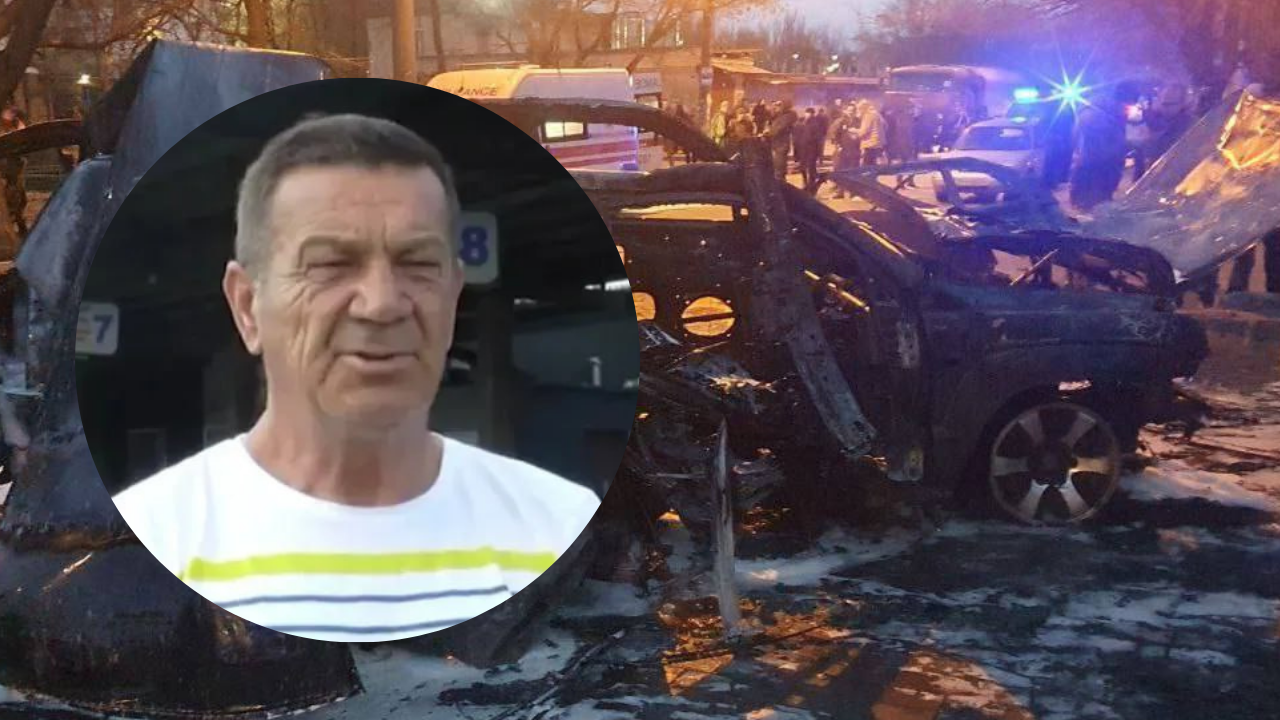
The collaborator Ivan Tkach, in whose assassination Artem Murdid and his family are suspected of being involved
— Overall, the Russian judicial system distorts reality not only in this case. Legal professionals in Russia cannot be unaware that a terrorist attack is defined as deliberate violence against civilians to intimidate them or coerce a government into particular actions. If it is assumed that the actions of the Murdid family were connected to some form of resistance or even subversive activity, then these are acts of civilian resistance to occupation, not terrorism, — Andrii Yakovliev explains. He notes that a military attack on Ivan Tkach, a civilian involved in organizing the transportation of enemy army personnel, leads to the conclusion that Tkach was directly engaged in combat-related activities and could theoretically be considered a legitimate target for attack by the opposing armed forces.
The expert emphasizes that further comments will follow once the full text of the verdict is available. However, even at this stage, it can be asserted that the judicial proceedings violated the right to a fair trial, which, in itself, constitutes a war crime.
This article was published with the support of the European Endowment for Democracy (EED). Its content does not necessarily reflect the official position of the EED. The views or opinions expressed herein are the sole responsibility of their authors.


